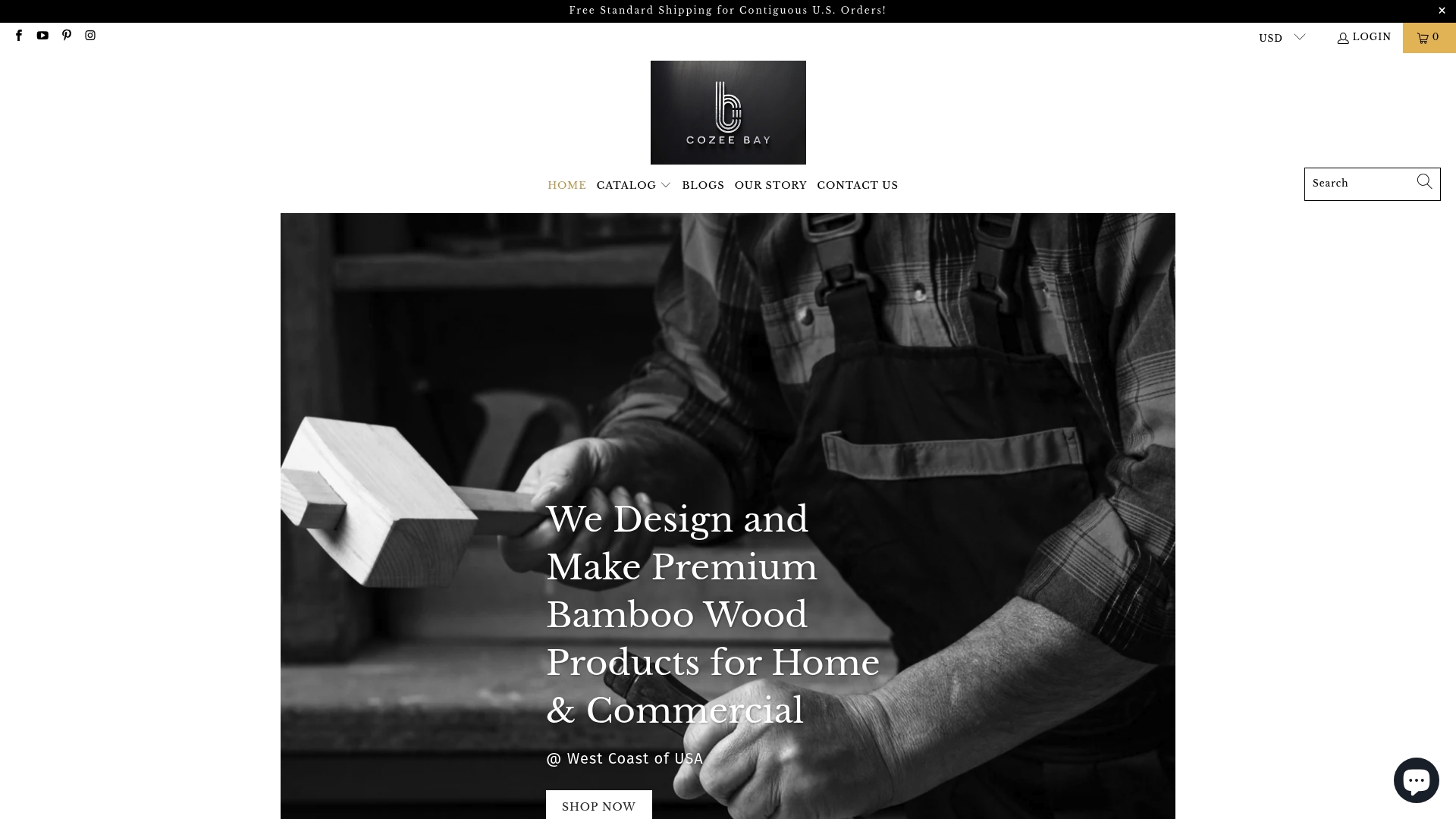Your Cart is Empty
Free Standard Shipping for Contiguous U.S. Orders!
Free Standard Shipping for Contiguous U.S. Orders!
Catalog

Bamboo Kitchenware: Complete Guide to Its Advantages
October 18, 2025 6 min read
Did you know bamboo can grow up to three feet in just one day? This amazing speed has helped bamboo kitchenware become a top choice for people who care about the planet. Not only does bamboo provide strength and natural antibacterial protection, it also offers a safe alternative to plastic and metal tools. As more households move toward eco-friendly living, bamboo stands out for its blend of sustainability, durability, and everyday practicality.
Key Takeaways
| Point | Details |
|---|---|
| Sustainability | Bamboo kitchenware is a rapidly renewable resource that offers a significantly lower carbon footprint compared to traditional materials. |
| Durability and Maintenance | Bamboo kitchenware is durable, but requires mindful care to prevent water damage and maintain its lifespan. |
| Health Benefits | Naturally antibacterial and chemical-free, bamboo kitchenware is a safe alternative to plastic and metal cooking tools. |
| Aesthetic Appeal | Bamboo kitchenware combines functionality with style, enhancing kitchen spaces with its organic elegance and unique grain patterns. |
Table of Contents
- Defining Bamboo Kitchenware And Its Core Benefits
- Types And Uses Of Bamboo Kitchenware Products
- Eco-Friendliness And Sustainability Explained
- Durability, Maintenance, And Daily Use Factors
- Comparing Bamboo With Other Kitchenware Materials
Defining Bamboo Kitchenware and Its Core Benefits
Bamboo kitchenware represents a revolutionary approach to sustainable home goods, transforming everyday kitchen tools into environmentally conscious solutions. At its core, bamboo kitchenware refers to kitchen utensils, cutting boards, serving trays, and other culinary accessories crafted entirely from bamboo wood.
According to research from sustainable materials experts, bamboo offers remarkable advantages that set it apart from traditional wood and synthetic materials. Read more about bamboo’s unique properties reveals that bamboo is a fast-growing renewable resource, maturing in just 3–5 years compared to hardwood trees that take decades. This rapid growth makes bamboo an incredibly sustainable material with a significantly lower carbon footprint.
The core benefits of bamboo kitchenware are both practical and environmental:
- Sustainability: Rapid renewable growth cycle
- Durability: Stronger than traditional wooden utensils
- Hygiene: Naturally antibacterial and anti-mold
- Safety: Does not leach harmful chemicals
- Maintenance: Stain and odor-resistant
Moreover, bamboo kitchenware isn’t just environmentally friendly—it’s functionally superior. As experts note, bamboo utensils are hypoallergenic, easy to clean, and provide a healthy alternative to plastic or metal cooking tools. Its natural antimicrobial properties make it an excellent choice for health-conscious consumers seeking safe, sustainable kitchen solutions.
Types and Uses of Bamboo Kitchenware Products
Bamboo kitchenware encompasses a wide range of functional and stylish products designed to transform your cooking and dining experience. According to eco-friendly design experts, these versatile kitchen tools blend practicality with sustainable aesthetics, offering solutions for every culinary need.
Discover more about bamboo product innovations, the primary types of bamboo kitchenware include:
- Cutting Boards: Durable surfaces for food preparation
- Cooking Utensils: Lightweight spatulas, spoons, tongs, and ladles
- Serving Platters: Elegant platforms for presenting meals
- Bowls and Containers: Versatile storage and serving options
- Kitchen Accessories: Drawer organizers, utensil holders, and more
Research highlights that bamboo kitchen tools are extraordinarily lightweight and adaptable. They’re perfect not just for home kitchens, but also for outdoor adventures like camping and picnics. The compostable nature of bamboo makes these products an excellent choice for environmentally conscious consumers who refuse to compromise on functionality.
Beyond their practical applications, bamboo kitchenware brings natural warmth and organic elegance to kitchen spaces. Their unique grain patterns and earthy tones complement modern and traditional kitchen designs alike, transforming everyday cooking tools into statement pieces that reflect a commitment to sustainability and thoughtful design.

Eco-Friendliness and Sustainability Explained
Sustainability in kitchenware goes far beyond a simple purchasing decision—it’s a commitment to reducing environmental impact through conscious consumption. Learn more about sustainable home solutions, bamboo kitchenware represents a holistic approach to eco-friendly living that addresses multiple environmental challenges.
The sustainability of bamboo kitchenware can be understood through several critical dimensions:
- Rapid Regeneration: Bamboo grows exponentially faster than traditional wood sources
- Low Carbon Footprint: Minimal processing required compared to metal or plastic alternatives
- Biodegradability: Complete decomposition without long-term environmental contamination
- Renewable Resource: Can be harvested without destroying the entire plant system
- Minimal Chemical Processing: Requires fewer industrial interventions during production
Unlike conventional materials that deplete natural resources and contribute to long-term waste, bamboo offers a regenerative solution. Its growth cycle actively contributes to carbon sequestration, with bamboo forests absorbing significantly more carbon dioxide than equivalent tree plantations. This makes bamboo kitchenware not just a neutral choice, but a potentially positive environmental intervention.
Choosing bamboo kitchenware is more than a trend—it’s a meaningful step toward responsible consumption. By selecting products that are sustainably sourced, biodegradable, and produced with minimal environmental impact, consumers can directly contribute to reducing global waste and supporting more regenerative manufacturing practices.
Durability, Maintenance, and Daily Use Factors
Bamboo kitchenware combines impressive durability with specific care requirements that ensure long-lasting performance. Explore our comprehensive maintenance guide to maximize the lifespan of these eco-friendly kitchen tools.
According to research on material properties, bamboo cutting boards demonstrate exceptional resilience, withstanding up to three times more pressure than traditional maple boards. Their unique characteristics include:
- Dense Fiber Structure: Resists knife scarring
- Slight Elasticity: Preserves blade sharpness
- Humidity Resistance: Less prone to warping
- Natural Antimicrobial Properties: Inherent protection against bacterial growth
However, bamboo kitchenware requires mindful maintenance. The material’s porous nature means these tools are susceptible to water damage, warping, and potential mold development if not properly cared for. Key maintenance practices include hand-washing, thorough drying after each use, and avoiding prolonged water exposure or high-heat environments.
While bamboo kitchenware demands more attention than some synthetic alternatives, its combination of durability, eco-friendliness, and natural aesthetic makes it a compelling choice for conscious consumers. By understanding and respecting its unique properties, users can enjoy bamboo kitchen tools that are both beautiful and functional for years to come.
Comparing Bamboo With Other Kitchenware Materials
Kitchenware materials each come with unique characteristics, but bamboo stands out as a remarkable alternative to traditional options. Learn more about sustainable kitchen solutions, bamboo offers distinct advantages over plastic, metal, and hardwood materials.
When comparing bamboo to other kitchenware materials, several key differences emerge:
- Plastic: Bamboo avoids harmful chemicals like BPA
- Metal: Lower carbon footprint and natural antimicrobial properties
- Hardwood: Faster renewable resource with less environmental impact
- Silicone: More eco-friendly and biodegradable alternative
Research indicates that while bamboo excels in sustainability and safety, it does have some limitations compared to materials like stainless steel. Bamboo demonstrates lower heat resistance and requires more careful maintenance. Its porous nature means it’s less durable under extreme cooking conditions, making it better suited for specific kitchen tasks that don’t involve prolonged high-temperature exposure.
Ultimately, bamboo kitchenware represents a thoughtful compromise between performance and environmental responsibility. Its natural antimicrobial properties, chemical-free composition, and biodegradability make it an excellent choice for eco-conscious consumers who want to reduce their environmental footprint without sacrificing kitchen functionality.
Here’s how bamboo compares to other common kitchenware materials:

| Feature | Bamboo | Plastic | Metal | Hardwood |
|---|---|---|---|---|
| Sustainability | Renewable Biodegradable |
Non-renewable Not biodegradable |
High energy use Recyclable |
Renewable Slow-growing |
| Antimicrobial | Naturally antimicrobial | Some treated versions | Not antimicrobial | Mildly antimicrobial |
| Chemical Safety | Chemical-free | May contain BPA/chemicals | No BPA May leach metals |
Chemical-free |
| Durability | Durable Water sensitive |
Highly durable May stain |
Extremely durable | Durable Prone to cracking |
| Maintenance | Hand wash Dry quickly |
Dishwasher safe | Dishwasher safe | Hand wash Oil often |
Elevate Your Kitchen With Bamboo: Upgrade to Eco-Friendly Style Today
Tired of kitchen tools that are bad for the environment and quick to wear out? This guide highlights how bamboo kitchenware gives you sustainable quality, natural antimicrobial protection, and a stylish look—all while being easier on the planet. But the benefits of bamboo do not end with utensils. At Cozee Bay, you can bring those same advantages to your whole kitchen routine.
Explore our premium Bamboo Paper Towel Dispensers designed for both homes and businesses that want a cleaner, greener, and neater space. These handcrafted dispensers reflect the impressive durability, eco-friendliness, and low-maintenance qualities outlined in the article.

Ready for a kitchen upgrade that is practical and sustainable? Visit Cozee Bay today to find not only bamboo paper towel dispensers but also functional drawer organizers and wrap dispensers with cutter. Shop now and let your everyday choices match your commitment to a healthier home and planet.
Frequently Asked Questions
What are the main benefits of using bamboo kitchenware?
Bamboo kitchenware offers numerous benefits including sustainability due to its rapid growth cycle, durability that surpasses traditional wooden utensils, natural antibacterial properties for improved hygiene, safety as it does not leach harmful chemicals, and low maintenance requirements such as being stain and odor-resistant.
How do I care for bamboo kitchenware to ensure its longevity?
To maintain bamboo kitchenware, wash it by hand and dry it thoroughly after each use. Avoid prolonged exposure to water and high heat to prevent warping and potential mold development. Proper care will help ensure your bamboo utensils last for years.
How does bamboo kitchenware compare to plastic and metal utensils?
Bamboo kitchenware is more sustainable than plastic, as it is biodegradable and chemical-free, avoiding harmful substances like BPA. Compared to metal, bamboo has a lower carbon footprint and natural antimicrobial properties, but it requires more cautious handling as it is less heat resistant.
Is bamboo kitchenware safe for food and cooking?
Yes, bamboo kitchenware is safe for cooking and food preparation as it is naturally antimicrobial and does not leach harmful chemicals, making it a healthy alternative to plastic and metal kitchen tools.
Recommended
Leave a comment
Comments will be approved before showing up.
Subscribe
Sign up to get the latest on sales, new releases and more …

